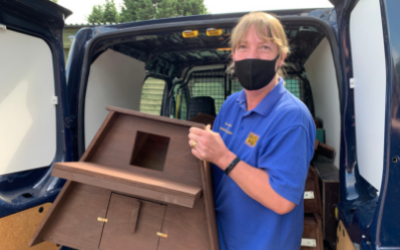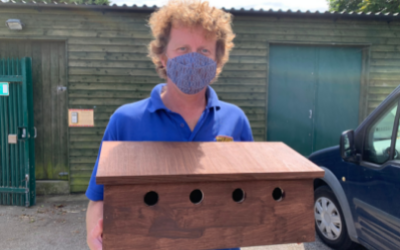
Drusillas Conservation - The Dormouse Project
PUBLISHED 28/09/21
Drusillas are recognised as one of the very best small zoos in the UK and currently have over 100 species of exotic animals. We are members of BIAZA (The British Association of Zoos and Aquaria) and EAZA (The European Association of Zoos and Aquariums). Our keepers and our management team work to high ethical standards to ensure Drusillas remains one of the best zoos in the country both for visitors and for our animals.
We support four conservation projects outside the UK; Drusillas in Africa, Falkland Island Conservation, Golden Lion Tamarins of Brazil and SloCo. We wanted to increase the amount of UK conservation and native species support we are invovled in and have committed to investing in the Dormouse Project in conjunction with People's Trust for Endangered Species.

By increasing the number of nest boxes on site, we can greatly help species such as dormice, butterflies, bats, small birds and owls to thrive locally.
The dormouse boxes will be situated at a site near to Drusillas that has ideal dormouse habitat, these will be monitored by zoo keepers and education staff monthly in conjunction with People's Trust for Endangered Species, who we also carried out water vole survey work with recently, we have a survey of the butterfly population on site carried out four times a year.
The nest boxes were funded by money collected in gophers gold - one of the Park's money collection interactives.

Sue Woodgate Zoo Business Manager said; "I am so excited to be increasing the number of nest boxes at Drusillas and look forward to lots of baby birds next year, and hopefully some beautiful bats taking up residence in the bat boxes!"
"We know from some survey work carried out a few years ago that we have quite a number of bat species on site, we aim to do another survey soon to confirm what we now have around the site."
"Going forward we want to create some more wild flower areas around the park too, which will encourage habitation of butterflies and other lovely bugs!"
We'll keep you updated when we've checked our nest boxes.
Take a look at some of the other ways we are involved in conservation

Breeding Programmes
Many of the animals at Drusillas are involved in breeding programmes, often monitored by studbook keepers, to ensure the future survival of a species.
Primates in particular are a cause for concern. A large number of primate species are seriously threatened with extinction in the wild. There are many reasons for this, including forest clearance and illegal hunting to supply the bushmeat trade. Zoos and other animal collections help primate conservation, both through education and by captive breeding programmes.
Studbook Keeping
For many animal species, there will be a studbook keeper tasked by the European Association of Zoos and Aquaria (EAZA) to monitor captive populations throughout Europe.
Drusillas cooperates closely with studbook keepers who collect data on animals held in collections, and enter it into a studbook. This information includes details on which animal is related to which and monitors all the births, deaths and movements of animals between collections.
Record Keeping
Drusillas has been recognised by the Zoo Information Management System (ZIMS) for its high level of data accuracy. Animal records are important to animal collections; they are a bit like the records that doctors keep on humans. ZIMS maintains the information provided by the zoological community on an international scale, so its members can track the movement of an animal along with its genetic background. Drusillas falls into the top 5% of all zoos worldwide that use the animal record keeping system for their high level of data precision.
Keeper Training and Studies
In order that we can ensure our animals receive the best care, keeper training is paramount at Drusillas, both in-house and through external courses. Most keepers study the Diploma in the Management of Zoo and Aquarium Animals which allows them to gain a broader understanding of how zoos work and improve their knowledge of animal care, husbandry diets, enclosure design and enable them to carry out research into areas that they might not otherwise have the opportunity to explore.
Drusillas Zoo Keepers and external students also undertake research at the Park, which is used by other zoos and can sometimes be published. For example, our Head Keeper, Mark Kenward, recently won the Best Presentation Award at the mammal working group conference for one of his research projects which not only benefits the animals at Drusillas but animals at other collections.




